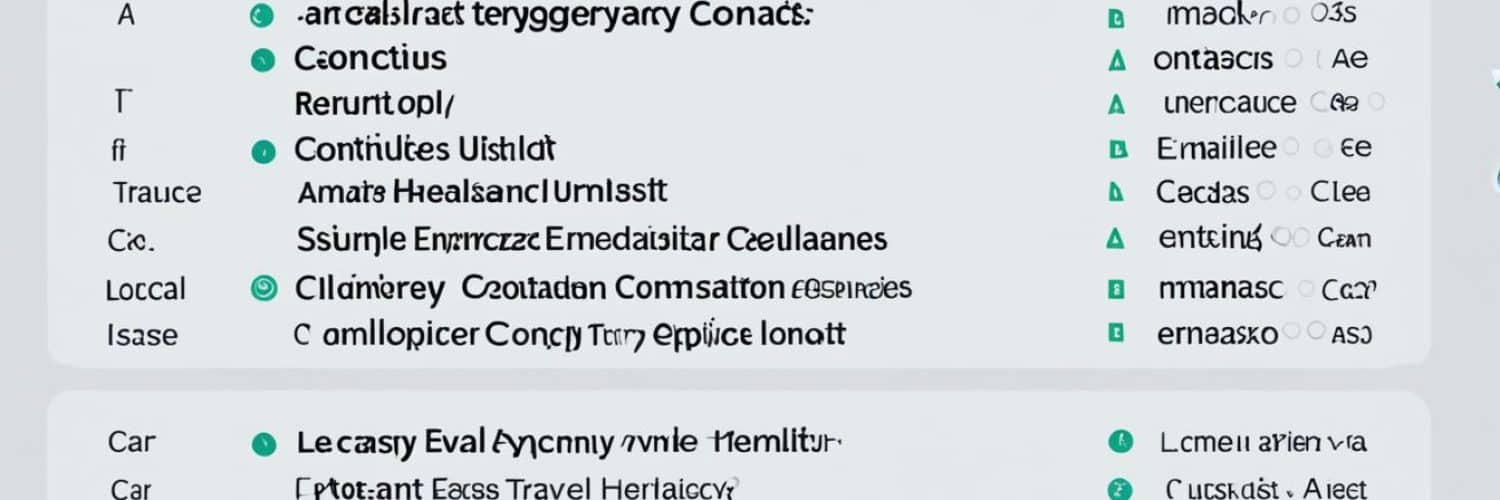Traveling is an exciting adventure that allows us to explore new places and create lasting memories. However, it’s crucial to prioritize safety and be prepared for any emergencies that may arise during your trip. One of the essential preparations you can make is creating a comprehensive travel emergency contacts list.
Having a well-organized and up-to-date list of emergency contact numbers can provide peace of mind and ensure that you have access to the necessary help and assistance in case of any unexpected situations. From medical emergencies to security concerns, having the right contacts at your fingertips can make all the difference in ensuring your well-being while you’re away from home.
Key Takeaways:
- Creating a travel emergency contacts list is essential for your safety while traveling.
- Include important numbers such as local emergency services, embassy or consulate contacts, and travel insurance providers.
- Organize your emergency contact information by creating travel emergency cards that can be easily carried with you.
- Research and understand local laws, customs, and medical care at your destination.
- Establish a communication plan with your loved ones and stay informed about potential travel advisories.
Why You Need an Emergency Contacts List
Traveling, especially alone, can leave you vulnerable in case of emergencies. It’s crucial to have an emergency contacts list to ensure that you can quickly and easily reach out for help when needed. From contacting local authorities to reaching out to embassy or consulate representatives, having the right numbers can save valuable time and potentially even save lives.
“Having an emergency contacts list is like having a lifeline while you’re on the road. It’s a simple precaution that can make a world of difference in critical situations.”
Imagine finding yourself in a foreign country, faced with a medical emergency or becoming a victim of theft. In these situations, every second counts, and being able to swiftly connect with essential contacts can be a game-changer.
Emergency hotlines, local authorities, and embassy or consulate representatives are key resources when you need urgent assistance. By having their numbers at your fingertips, you can reach out for help in the quickest and most efficient way possible. These contacts can guide you through difficult situations, provide valuable advice, and connect you with the necessary resources, whether it’s medical care, legal assistance, or safe shelter.
Here are some essential contacts that every traveler should have in their emergency list:
- Local emergency services: Contact numbers for police, fire department, and medical services in the countries you’ll visit.
- Embassy or consulate details: The contact information for your home country’s embassy or consulate, providing assistance to nationals abroad.
- Travel insurance provider: The hotline or assistance number for your travel insurance provider, so you can quickly report any incidents and access emergency assistance.
- Emergency contact back home: A trusted person’s contact details who can be notified in case of an emergency or need for assistance.
Having these essential contacts readily available ensures that you can take swift action during any unexpected event while traveling. This preparedness can provide peace of mind and give you the confidence to explore new places, knowing that you’re well-equipped to handle potential emergencies.
Remember, emergencies can happen anytime, anywhere, so it’s always better to be prepared. Keep a printed or digital copy of your emergency contacts list, and make sure it’s easily accessible in case you need it. Take a moment to input these numbers in your phone to have them readily available at all times.
Stay a Step Ahead with Travel Emergency Resources
While having an emergency contacts list is essential, it’s also important to be aware of additional travel emergency resources that can further enhance your preparedness. From online platforms to government programs, these resources can provide valuable information and support during challenging situations.
One such resource is the Smart Traveler Enrollment Program (STEP). Run by the U.S. Department of State, STEP allows travelers to register their trip and receive important alerts and updates about their destination. Enrolling in STEP can provide you with timely information about travel advisories, local conditions, and even enable the embassy or consulate to contact you in case of an emergency.
Another valuable travel emergency resource is international SOS, a global medical and security assistance company. They offer a range of services, including medical evacuation and assistance, travel security advice, and real-time alerts to keep you informed about any potential risks or emergencies at your destination.
Utilizing such travel emergency resources can provide you with an extra layer of safety and peace of mind during your travels.
| Travel Emergency Resources | Description |
|---|---|
| Smart Traveler Enrollment Program (STEP) | An official program by the U.S. Department of State that allows travelers to receive important alerts and updates about their destination. |
| International SOS | A global medical and security assistance company that provides services like medical evacuation, travel security advice, and real-time alerts. |
By being proactive and utilizing these travel emergency resources, you can further ensure your safety and well-being during your journeys.
Creating Your Travel Emergency Cards
When you’re on the go and facing an emergency, having quick access to important contact numbers is crucial. Creating travel emergency cards can help you organize all the essential information you need in case of an emergency. These cards are small, compact, and can easily fit into your wallet, passport, or travel bag for convenient access.
Emergency cards are your lifeline during unforeseen circumstances, providing a reliable means of reaching out for emergency assistance, urgent help, and accessing important numbers while traveling. Include important contact details like local emergency services, embassy or consulate contacts, travel insurance providers, and even your own emergency contact back home.
When creating your travel emergency cards, make sure to gather and record all the necessary information beforehand. Include the appropriate names, phone numbers, addresses, and any additional details relevant to each contact. Organize the information in a clear and legible format, ensuring that the cards are easy to read and understand, even in stressful situations.
Here’s an example of how your travel emergency card could look:
| Contact | Phone Number | Address |
|---|---|---|
| Local Emergency Services | 911 | N/A |
| U.S. Embassy | +1-555-123-4567 | 123 Embassy Lane, City |
| Travel Insurance Provider | +1-555-987-6543 | 456 Insurance Street, City |
| Emergency Contact Back Home | +1-555-789-0123 | N/A |
Remember, these cards are your lifeline in times of crisis, so keep them easily accessible whenever you’re traveling. By creating travel emergency cards, you’ll be better prepared to handle any unexpected situations with confidence, knowing that you have important numbers readily available.
Next, let’s explore some additional tips for emergency preparedness to further enhance your travel safety. Keep reading to learn more.
Additional Tips for Emergency Preparedness
Alongside your travel emergency cards, there are other important steps you can take to enhance your emergency preparedness. By taking these extra precautions, you can ensure your travel safety and be better equipped to handle unforeseen situations. Here are some additional tips:
Research and Understand Local Laws and Customs: Before embarking on your journey, familiarize yourself with the laws and customs of your destination. This knowledge will help you navigate any legal or cultural challenges that may arise, ensuring that you stay safe and respectful during your travels.
Enroll in the Smart Traveler Enrollment Program (STEP): The Smart Traveler Enrollment Program is a free service provided by the U.S. Department of State. By enrolling in STEP, you will receive important alerts and updates about your travel destination, including safety and security information. This will enable you to make informed decisions and stay informed throughout your trip.
Carry a Two-Week Supply of Essential Items: It’s always a good idea to be prepared with essential items in case of emergencies. Pack a two-week supply of food, water, and medication to ensure that you have enough provisions to sustain yourself during unexpected situations or circumstances that may limit access to resources.
Create a Communication Plan: Establish a communication plan with your loved ones, ensuring that they know how to reach you in case of an emergency. Share your travel itinerary, contact information, and any other relevant details. This will help to keep everyone informed and connected during a crisis.
Emergency Preparedness Checklist
| Emergency Preparedness Checklist |
|---|
| Research local laws and customs |
| Enroll in the Smart Traveler Enrollment Program (STEP) |
| Carry a two-week supply of essential items |
| Create a communication plan with loved ones |
By following these additional tips for emergency preparedness, you can enhance your travel safety and be better prepared to handle unexpected situations. Remember to research your destination, enroll in the Smart Traveler Enrollment Program, pack essential supplies, and establish a communication plan. Taking these precautions will help ensure that you can enjoy your trip with peace of mind and respond effectively to any emergency that may arise.
How to Stay Informed While Abroad
When traveling to a new destination, it’s crucial to stay informed about various aspects that can impact your trip. Keeping yourself updated on visa requirements, local laws, medical care, and travel advisories can help ensure a smooth and enjoyable experience. Let’s explore some key points to consider:
Research Visa Requirements
Before you embark on your journey, make sure to research the visa requirements of the country you plan to visit. Each destination has its own visa regulations, such as visa-free entry, visa-on-arrival, or visa application processes. By understanding the visa requirements in advance, you can avoid any last-minute surprises and potential complications.
Know the Local Laws and Customs
Being aware of the local laws and customs of your destination is essential for a respectful and trouble-free trip. Familiarize yourself with the cultural norms, traditions, and local regulations. Respectful behavior towards the local customs and adherence to the laws will not only prevent any legal issues but also help you engage positively with the local community.
Ensure Access to Medical Care
When traveling abroad, it’s essential to have access to appropriate medical care if needed. Research and identify healthcare facilities and hospitals in your destination that can provide quality medical services. It’s also advisable to carry travel health insurance to cover any unforeseen medical expenses that may arise during your trip.
Stay Updated on Travel Advisories
Travel advisories provide important information on safety and security issues in different countries. Before you depart, check your government’s travel advisories for any warnings or alerts related to your destination. Stay informed about potential risks or unstable situations that could affect your travel plans. Regularly reviewing travel advisories throughout your trip is advised to ensure informed decision-making.
| Country | Visa Requirements | Local Laws | Medical Care | Travel Advisories |
|---|---|---|---|---|
| United States | Visa-waiver program for some countries | Laws vary by state | Advanced healthcare system | Regular travel advisories issued |
| France | Visa required for most visitors | Strict regulations on alcohol consumption | Excellent healthcare facilities | Occasional travel advisories for certain regions |
| Australia | Visa required for most visitors | Stringent laws on wildlife protection | High-quality healthcare services | Regular travel advisories issued |
By staying informed about visa requirements, local laws, medical care, and travel advisories, you can ensure that your journey is safe and stress-free. Remember to do thorough research, stay up-to-date, and keep essential contact details, like the nearest embassy or consulate, readily available for emergencies.
Be Prepared for Crisis Situations
When it comes to traveling, being prepared for crisis situations is crucial. Packing essential items and documents can make all the difference in an emergency. Here are some key items to include in your emergency kit:
- A two-week supply of food and water
- Basic medical supplies such as band-aids, antiseptic wipes, and pain relievers
- Extra clothing and blankets
- A flashlight and extra batteries
- A whistle for signaling for help
It’s also important to keep your important documents safe. Here’s a checklist of documents to have on hand:
- Passports
- Birth abroad certificates
- Cash in the local currency
- Travel insurance details
- Basic translation cards for communicating in a foreign language
If you have any medical conditions, it’s crucial to ensure you have the necessary supplies. Make sure to pack enough medication for the duration of your trip, as well as any backup power sources for medical devices you rely on.
Emergency Kit Checklist
| Item | Quantity |
|---|---|
| Food (non-perishable) | 2 weeks supply |
| Water | 2 weeks supply |
| Medical supplies | As needed |
| Clothing and blankets | As needed |
| Flashlight and batteries | 1 flashlight, extra batteries |
| Whistle | 1 |
By preparing an emergency kit and keeping important documents secure, you can have peace of mind while traveling. Being prepared for crisis situations ensures that you have the necessary resources to stay safe and handle emergencies effectively.
Establishing Communication Channels
In times of crisis, it’s crucial to establish effective communication channels to keep yourself and your loved ones informed and connected. Traditional communication methods may become disrupted, making it essential to have alternative methods in place.
Create a Communication Plan
Begin by creating a communication plan with your family and friends. This plan should outline the steps you will take to stay in touch during emergencies. Make sure everyone knows how to reach each other and establish a designated point of contact who can distribute updates to the rest of the group.
Utilize Social Media Updates and Messaging Apps
During a crisis, social media can be a valuable tool for sharing updates and letting your loved ones know that you are safe. Consider using platforms like Facebook, Twitter, or Instagram to provide regular updates. Additionally, messaging apps such as WhatsApp or Telegram can offer a private and secure means of communication.
Keep an Emergency Contact List Handy
Having a readily accessible list of emergency contacts is essential. Include important numbers such as local emergency services, the nearest embassy or consulate, and your travel insurance provider. Store this list in your phone, keep a physical copy with you, and share it with your travel companions.
Stay Connected with Official Sources
During emergencies, official sources like U.S. embassies or consulates often provide crucial information and assistance. Stay connected with them by signing up for email notifications or following their social media accounts. They can provide updates on local conditions, travel advisories, and other relevant information.
“Establishing effective communication channels is vital in times of crisis. By creating a communication plan, utilizing social media updates and messaging apps, keeping an emergency contact list handy, and staying connected with official sources, you can ensure that you and your loved ones stay informed and connected.” – Travel Safety Expert
Ensuring Personal Safety
During crisis situations, prioritizing personal safety is of utmost importance. By having an exit strategy in mind and familiarizing yourself with alternative routes, you can navigate road closures or unsafe conditions effectively. Additionally, it is crucial to follow instructions from local authorities, including evacuation orders, to ensure your safety and the safety of others.
In order to stay informed, rely on local radio, television, or official sources for updates and crucial information. Being aware of the latest developments can help guide your decision-making process and facilitate your response to the situation at hand.
Furthermore, take the time to familiarize yourself with emergency plans provided by hotels or tour operators. Understanding these protocols will enable you to respond effectively in case of an emergency.
By integrating these strategies into your travel plans, you can enhance your personal safety and minimize potential risks, allowing you to explore the world with peace of mind.
Conclusion
Traveling is an extraordinary adventure filled with new experiences and unforgettable moments. However, it is crucial to prioritize your safety and be prepared for any unexpected emergencies that may arise along the way. By taking the necessary steps to ensure travel preparedness, such as creating a comprehensive travel emergency contacts list and carrying travel emergency cards, you can safeguard your well-being while exploring the world.
Staying informed about your destination, understanding local laws and customs, and enrolling in programs like the Smart Traveler Enrollment Program (STEP) can provide invaluable resources and assistance in times of need. Additionally, packing an emergency kit and establishing communication channels with your loved ones will help you stay connected and informed during emergencies.
Remember, your safety is paramount. Always follow the instructions of local authorities, stay updated on travel advisories, and have an exit strategy in place. By prioritizing travel safety and preparedness, you can embark on your journeys with peace of mind, knowing that you have the essential resources and emergency contacts to handle any unforeseen circumstances that may arise.
FAQ
Why is it important to have an emergency contacts list while traveling?
Having an emergency contacts list is crucial because it ensures that you have quick access to the necessary help and assistance in case of emergencies during your travels.
What numbers should be included in a travel emergency contacts list?
How can I create travel emergency cards?
Travel emergency cards can be organized by creating small and compact cards that contain all the necessary contact information, which can be easily carried in your wallet, passport, or travel bag for quick access.
What other steps can I take for emergency preparedness while traveling?
In addition to travel emergency cards, you can enhance your emergency preparedness by researching destination laws and customs, enrolling in programs like the Smart Traveler Enrollment Program (STEP), and carrying essential items like food, water, and medication.
How can I stay informed about my destination while abroad?
To stay informed, research visa requirements, local laws, and available medical care at your destinations. Keep updated on travel advisories and enroll in programs like STEP to receive important safety and security messages. Have the contact details of the nearest embassy or consulate handy for emergencies.
What should I include in my emergency kit?
Your emergency kit should include a two-week supply of food, water, and necessary supplies. Keep passports, birth abroad certificates, cash, travel insurance details, basic translation cards, and any necessary medications in a secure and accessible place.
How can I establish communication channels in case of an emergency?
Establish a communication plan with loved ones, including alternative methods like social media updates or messaging apps. Keep a list of emergency contacts handy and regularly update friends and family about your well-being. Stay connected with official sources like U.S. embassies or consulates for valuable information during emergencies.
How can I ensure personal safety during crisis situations?
Prioritize personal safety by having an exit strategy and knowing alternative routes to safety. Follow instructions from local authorities, including evacuation orders, and stay informed through local radio, television, or official sources. Familiarize yourself with emergency plans at accommodations or with tour operators.
How can I be prepared for emergencies while traveling?
Being prepared involves creating a comprehensive travel emergency contacts list, carrying travel emergency cards, and following other preparedness tips. By prioritizing travel safety and having the right emergency contacts and resources, you can enjoy your travels with peace of mind.







Add comment